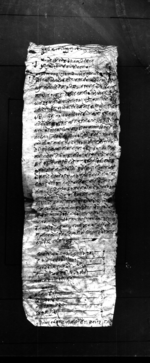A letter granting water-expiation to nine members of Pṛthī Bahādura Pā̃ḍe's family (VS 1928)
ID: K_0172_0063
Edited and
translated by Rajan Khatiwoda
in collaboration with
Simon Cubelic
Created: 2015-06-08;
Last modified: 2016-11-03
For the metadata of the document, click here
The accompanying edition, translation/synopsis and/or commentary are available under the terms of the Creative Commons Attribution-ShareAlike 4.0 International License
Abstract
The first part of the letter, probably issued by a dharmādhikārīn, explains the ritual procedures for undertaking expiation (see commentary on K_0175_0018 for a discussion of the term patiyā). The ritual procedure has been specifically prescribed for nine members (including servants) of the family headed by Pṛthvī Bahādura Pā̃ḍe, who was guilty of committing adultery (see K_0175_0018). They nine became polluted through having afterwards met their incestuous husband, father or master, and then having eaten rice together with him. The second part of the letter certifies the water-expiation granted to them, although it explicitly mentions that they are still excluded from eating cooked rice together with fellow caste members. One Kaptāna Khaḍga Siṃ Bhaḍārī Kṣatrī had submitted a petition to the prime minister to allow water-expiation to be granted to the remaining family members of Pṛthī Bahādura in view of the first wife of Pṛthī Bahādura, Rāja Kumārī, having already been granted such expiation (see K_0175_0018 and K_0175_0032 and K_0175_0034). The prime minister responded to this petition by issuing an executive order to the court Iṭācapali that water-expiation should be shall be granted in the same way as it had been to Rāja Kumārī before (see K_0175_0032 and K_0175_0034).Diplomatic edition
[1r]
1श्रीमद्गोरक्षभूपेन्द्रप्रेरीतस्मृतिसंमतम्॥2दुरितच्छेदनोपायंप्रायश्चित्तसमाचर॥१॥1श्री३महाराज
2ज ¯¯¯¯¯
3१1प्रथमदिननरवहादुररकिष्णविर्यालेमुंण्डनगरिअरुलेनङ
2छेदनगरितिलकल्कमाटोभस्मपंचगव्यलेपनगरिस्नान
3गर्नुतसदिनदिनैमाहविष्यग्रास१५षानुदोश्रादिनरात्री
4माग्रास१२षानुतेश्रादिननमागीकसैलेषाभनीदिया
5ग्रास२४षानुचौथादिननिराहारगर्नुयस्तारितलेफेरी३
6गर्दादिन१२हुंछ१३दिन्मापंचगव्यषाइव्राह्मणलाइसिधा
7दक्षिणादिनुसहरकाठमाडौनरदेवीटोलवस्न्यापृथीवाहादुर
8पाडेक्षेत्रीलेआफ्नाहाडमा४/५पुस्ताकाभाउज्यूरदिदीना
9तापर्न्याकोस्मेत्करनीगर्याकामुद्दा१५साल्मानिजपाडेमदे
10सतर्फजादानीजकासंगमागयाकाज्येठीमुषेनीरअरुतपसि
11लवमोजीम्कामानीसनीजपृथीवहादुरसंगभतीयापछी
12जेठीमुषेनीलेभन्यापतियापाइन्यकैसरहकातपसिल्का
13मानीसलेपनिसोहीसरहपतियापाउनुपर्न्याहोभनीक
14प्तानषड्गसिंभडारीक्षेत्रीले¯१¯काहजुर्माविन्तीपार्दाहु
15कुम्वमोजीम्नीजपाडेकीजेठीमुषेनीलाइपतियाभया
16कोहुनालेनीजपाडेकाअरुजहानतपसिलवमोजीम्कामा
17नीसलाइपनीअदालतइटाचपलिवाट्पानीकोमात्रप
18तीयागराइदिनुभंन्याहुकुम्भयाकोसाचोहोभनी२८साल
19वैसाष>वदि२रोज६माछापलागीआयाकापुर्जीवमोजी
20म्नीजवमोजीम्तपसिल्कामानीसजना९कोभात
21वाहेकैछपानीमात्रसुद्ध¯¯ ¯¯¯¯¯¯¯ ¯¯¯
तपसील1नीजपाडेकीव्याहीतामाहीलीमुषनीहरकुमारी¯¯¯¯¯¯¯१
2ऐकाछोरावर्ष४कोनरवहादुर¯¯¯¯¯¯¯१
3नीजपाडेकील्याइतामुषेनीहरिलिला¯¯¯¯¯¯¯१
4ऐ¯¯¯छोरीवर्ष५कीत्रिविक्रमदेवी¯¯¯¯¯¯¯१
5भान्स्यावाहुनीलक्ष्मीदेवी¯¯¯¯¯¯¯१
चाकर1धर्मसीलाकेटी¯¯¯¯¯¯¯१
2किष्नविर्याकेटो¯¯¯¯¯¯¯१
3मोहनकुमारीकेटी¯¯¯¯¯¯¯१
4इन्द्रकुमारीकेटी¯¯¯¯¯¯¯१इतिसम्वत्१९२८सालमीतीवैसाषवदी३रो७[?]
Translation
[1r]
1By order of the venerable king of Gorkhā, perform prāyaścitta, in accordance with the smṛtis, as a remedy that removes evil.1
Śrī 3 Mahārājadhirāja (i.e., Prime Minister and Commander-in-Chief Jaṅga Bahādura Kuvãra Rāṇā) ---1
On the first day, Nara Bahādura and Kṛṣṇa Vīra2 should shave [their] heads and [along with] the other persons [mentioned below] should cut their nails,3 should anoint their bodies with sesamum husks (tilakalka), [sacred] ash and the five cow products4 and take a bath. On the same day, during the day time, they should eat 15 mouthfuls of sacrificial food. On the second day, during the night-time, they should eat 12 mouthfuls. On the third day, they should eat if somebody offers [food] without their having asked [for any]. On the fourth day, they should fast (nirāhāra). [They should pass] twelve days repeating [the same procedure] three times.5 On the thirteenth day, they should eat the five cow products and offer dakṣīṇā [together with other] uncooked ritual offerings (sīdhā) to a Brahmin.
Kaptāna Khaḍga Siṃ Bhaḍārī Kṣatrī submitted [the following] petition to ---1--- (i.e. the prime minister) which states: “Regarding the case of adultery committed by Pṛthī Bahādura Pā̃ḍe, a resident of Naradevī Ṭola of Kathmandu city, with the [non-widowed] wife of a 4th/5th-generation cousin and with a 4th/5th-generation female cousin in the [Vikrama] year [19]15, Jeṭhī Mukhenī and the persons listed in the details [below] were polluted through eating rice with him after they had fled to the Terai with him. [Given that] Jeṭhī Mukhenī6 (i.e. Rāja Kumārī Pā̃ḍe) had been granted expiation by the order given, the other similarly [polluted] people who are listed in the details [below] should also be granted similar expiation”.
[Concerning this matter], on Friday, the 2nd of the bright fortnight of Vaiśākha in the [Vikrama] year [19]28, stamped official note (chāpa lāgīāyāko pūrjī) has arrived, stating: "The order given to the Iṭācapalī court to grant water-expiation to the other members of Pṛthī Bahādura Pā̃ḍe's family listed in the details below is right given that his Jeṭhī Mukhenī granted expiation7 ”. In accordance with this note, the nine people [listed] in the details below [have been granted] water-expiation.
Details
1Byāhītā (i.e. the lawful wife) Māhīlī Mukhenī Hara
Kumārī8 of [Pṛthī Bahādura]
Pā̃ḍe---1
2his 4 year old son Nara Bahādura ---1
3Lyāitā (concubine) Mukhenī Harililā of [Pṛthī Bahādura] Pā̃ḍe ---1
4his 5 years old daughter Trivikrama Devī ---1
5[the female] Brahmin cook Lakṣmī Devī ---1
Servants
2The girl Dharmasīlā ---1
2The boy Kṛṣṇa
Vīra ---1
3The girl Mohana Kumārī ---1
4The girl Īndra Kumārī ---1
Saturday, the 3rd of the dark fortnight of Vaiśākha in the [Vikrama] year 1928.
Commentary
Despite the fact that there is no mention of who drew up the document, it can be argued on the basis of the following points that the document was issued by a dharmādhikārīn to the petitioners as an official certificate. 1. It is explicitly mentioned in the Ain of 1854 that only dharmādhikārīns are entitled to perfom the rite of expiation, once they receive an official written note (pūrjī) from the courts or an attested written order (pramāṅgī) from proper authorities (see MAKM 1854/89 §2-(8). 2. We see that the first part of the letter spells out the ritual procedures to be undertaken by the family members polluted through association with Pṛthī Bahādura. The Ain of 1854 is silent on such procedures, and a dharmādhikārīn whould have been the most likely authority competent to prescribe them. According to smṛti texts for instance (MDh 11.84-85), three Brahmins who are learned in the Vedas are allowed to prescribe penances.

